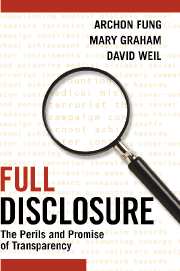Book contents
- Frontmatter
- Dediaction
- Contents
- List of Figures and Tables
- Preface
- 1 Governance by Transparency
- 2 An Unlikely Policy Innovation
- 3 Designing Transparency Policies
- 4 What Makes Transparency Work?
- 5 What Makes Transparency Sustainable?
- 6 International Transparency
- 7 Toward Collaborative Transparency
- 8 Targeted Transparency in the Information Age
- Appendix: EighteenMajor Cases
- Notes
- Bibliography
- Index
1 - Governance by Transparency
Published online by Cambridge University Press: 27 July 2009
- Frontmatter
- Dediaction
- Contents
- List of Figures and Tables
- Preface
- 1 Governance by Transparency
- 2 An Unlikely Policy Innovation
- 3 Designing Transparency Policies
- 4 What Makes Transparency Work?
- 5 What Makes Transparency Sustainable?
- 6 International Transparency
- 7 Toward Collaborative Transparency
- 8 Targeted Transparency in the Information Age
- Appendix: EighteenMajor Cases
- Notes
- Bibliography
- Index
Summary
THE NEW POWER OF INFORMATION
On September 12, 2000, Masatoshi Ono, the chief executive of leading U.S. tire manufacturer Bridgestone/Firestone, faced a panel of senators and a battery of television cameras in a packed hearing room. The senate panel was investigating mounting deaths fromamysterious series of auto accidents in which tires blew out without warning, causing vehicles – many of them Ford Explorer SUVs – to roll over. Addressing the senators and the room full of victims’ families, auto safety advocates, and industry representatives, as well as a nationwide television audience, Ono uttered words that no CEO wants to say: “I come before you to expressmy deep regret and sympathy to you, the American people and especially to the families who have lost loved ones in these terrible rollover accidents.”
The Firestone scandal remained national news during the summer and fall of 2000 because auto companies and tire makers had failed to informthe public about deadly risks. Documents from Firestone/Bridgestone and Ford indicated that both companies had been aware of a pattern of fatal accidents caused by a combination of tire tread separation and top-heavy SUVs but had done nothing to alert drivers. Bridgestone/Firestone executives knew that its plant in Decatur, Illinois, where most of the problem tires were made, had long had quality-control problems. When the count was finally complete, 271 people had been killed in accidents involving problematic SUV design and defective tires.
The public, however, learned about these problems only by chance – and only aftermanyof the deathsandinjuries. InearlyFebruaryof 2000,Houston station KHOU-TV reported that lawsuits claimed that exploding Firestone tires and associated Explorer rollovers had caused thirty deaths. It took another six months for Bridgestone/Firestone executives to acknowledge the problem and recall 6.5 million tires, the largest tire recall since the 1970s.
More troubling, the Senate investigation revealed that the problem was larger than a limited number of defective tires. In the 1990s, many people bought SUVs because they thought they were safer than smaller cars. The Firestone/Explorer revelations showed that, to the contrary, SUVs were more likely to roll over than other cars – and some SUV models were much more prone to roll over than others. That was important because rollovers remained the most deadly auto accidents, accounting for nearly a third of auto fatalities in the United States even though they represented less than 4 percent of all accidents.
- Type
- Chapter
- Information
- Full DisclosureThe Perils and Promise of Transparency, pp. 1 - 18Publisher: Cambridge University PressPrint publication year: 2007
- Creative Commons
- This content is Open Access and distributed under the terms of the Creative Commons Attribution licence CC-BY-NC 4.0 https://creativecommons.org/cclicenses/



